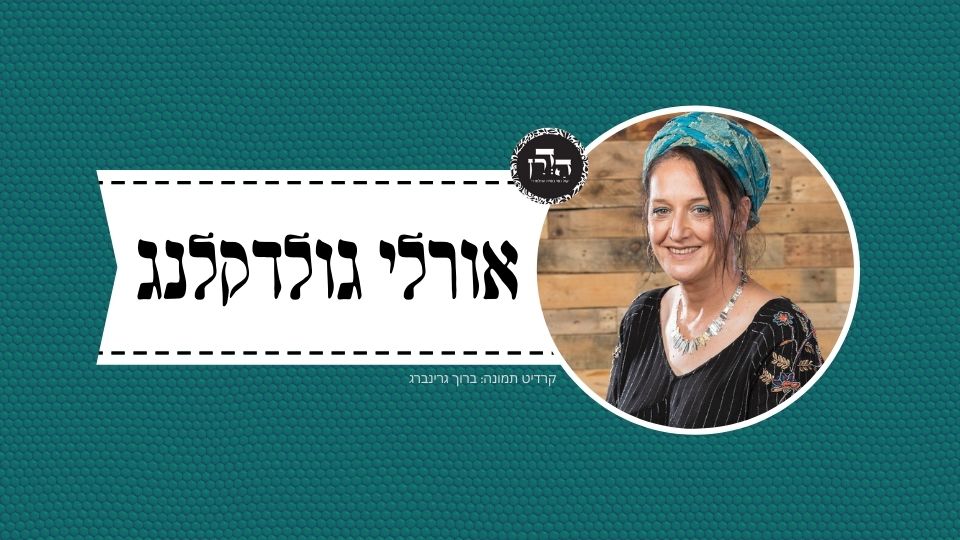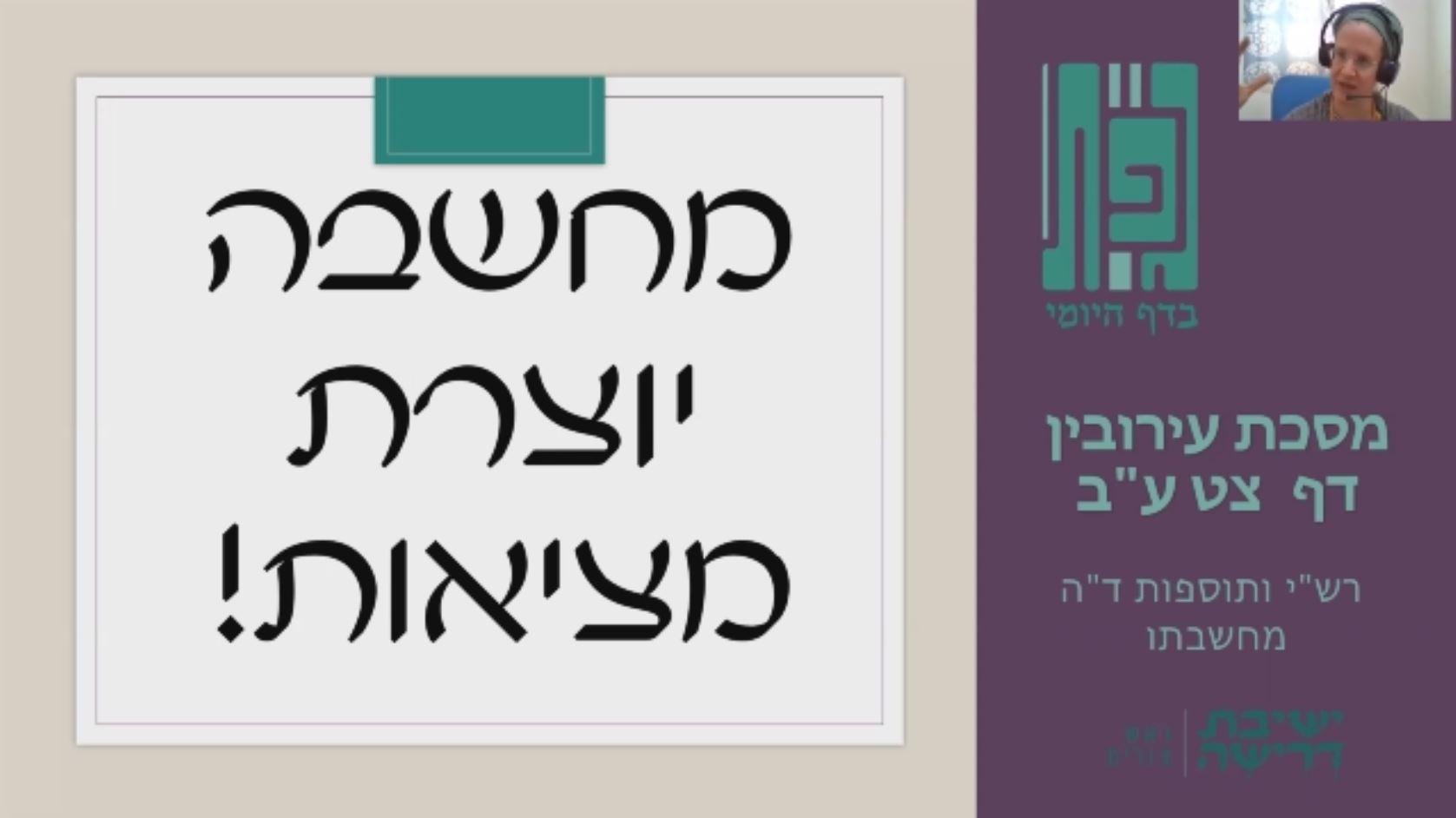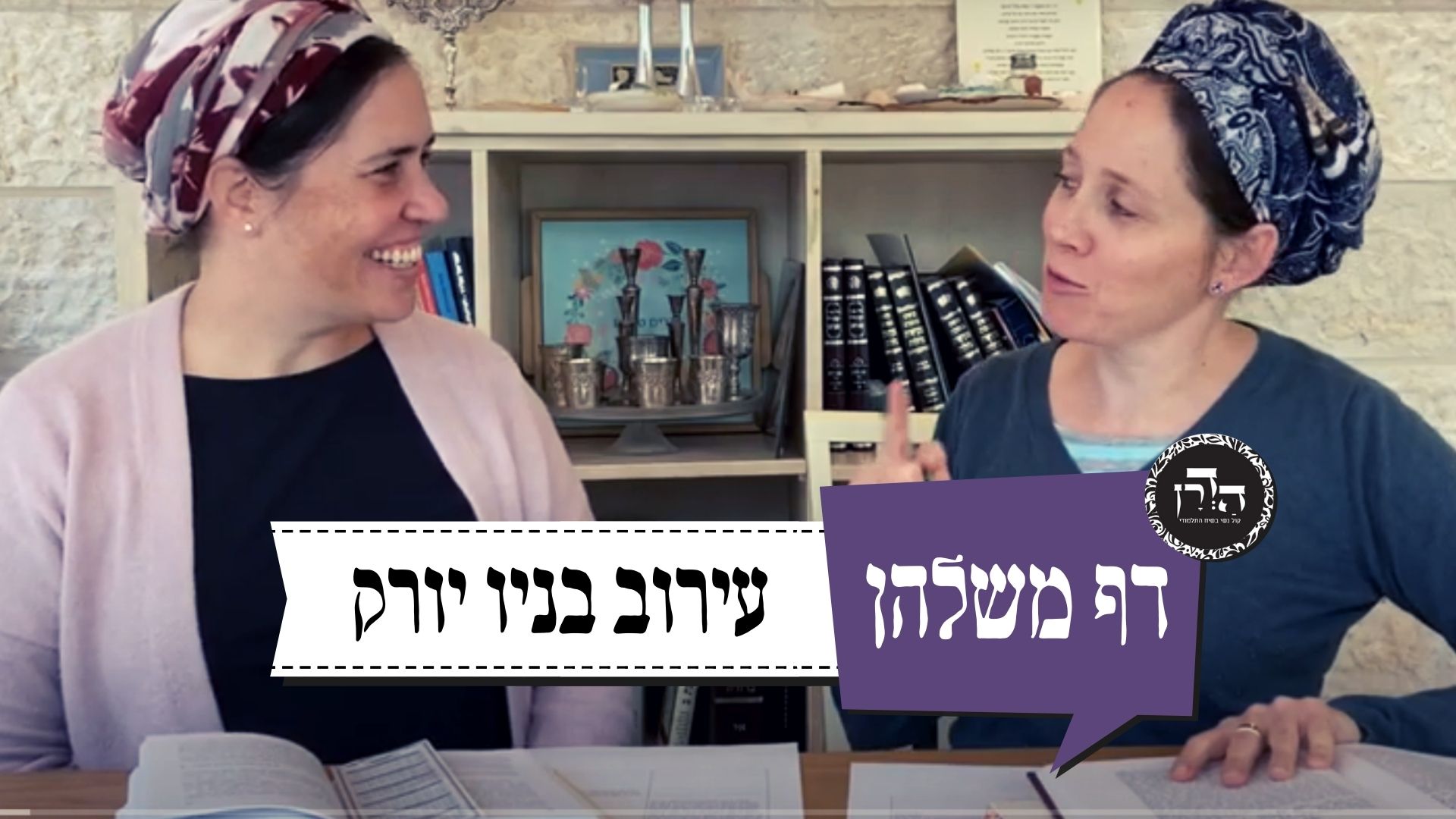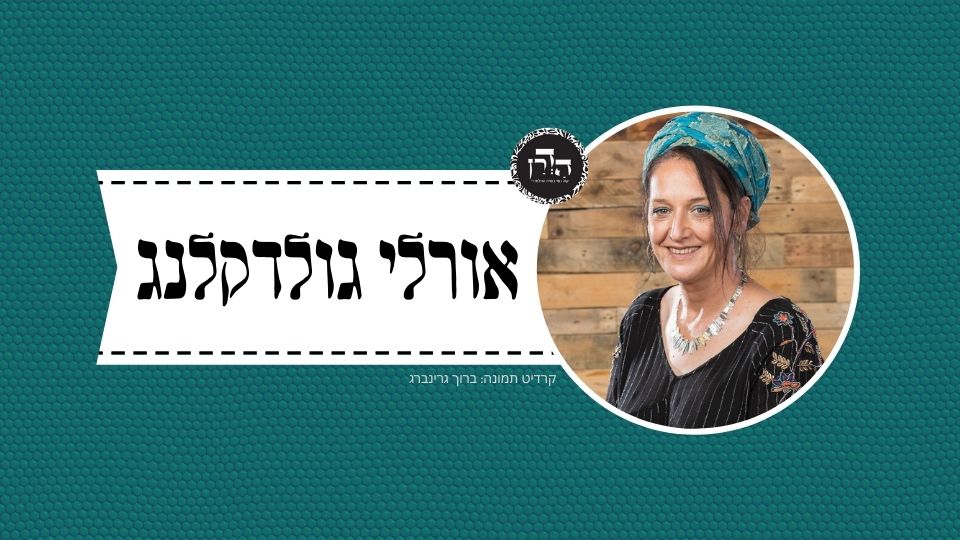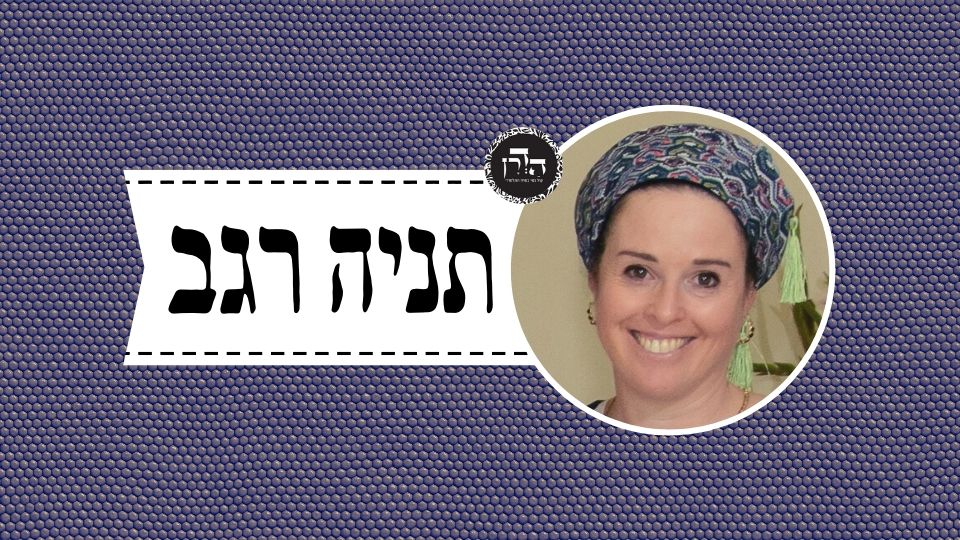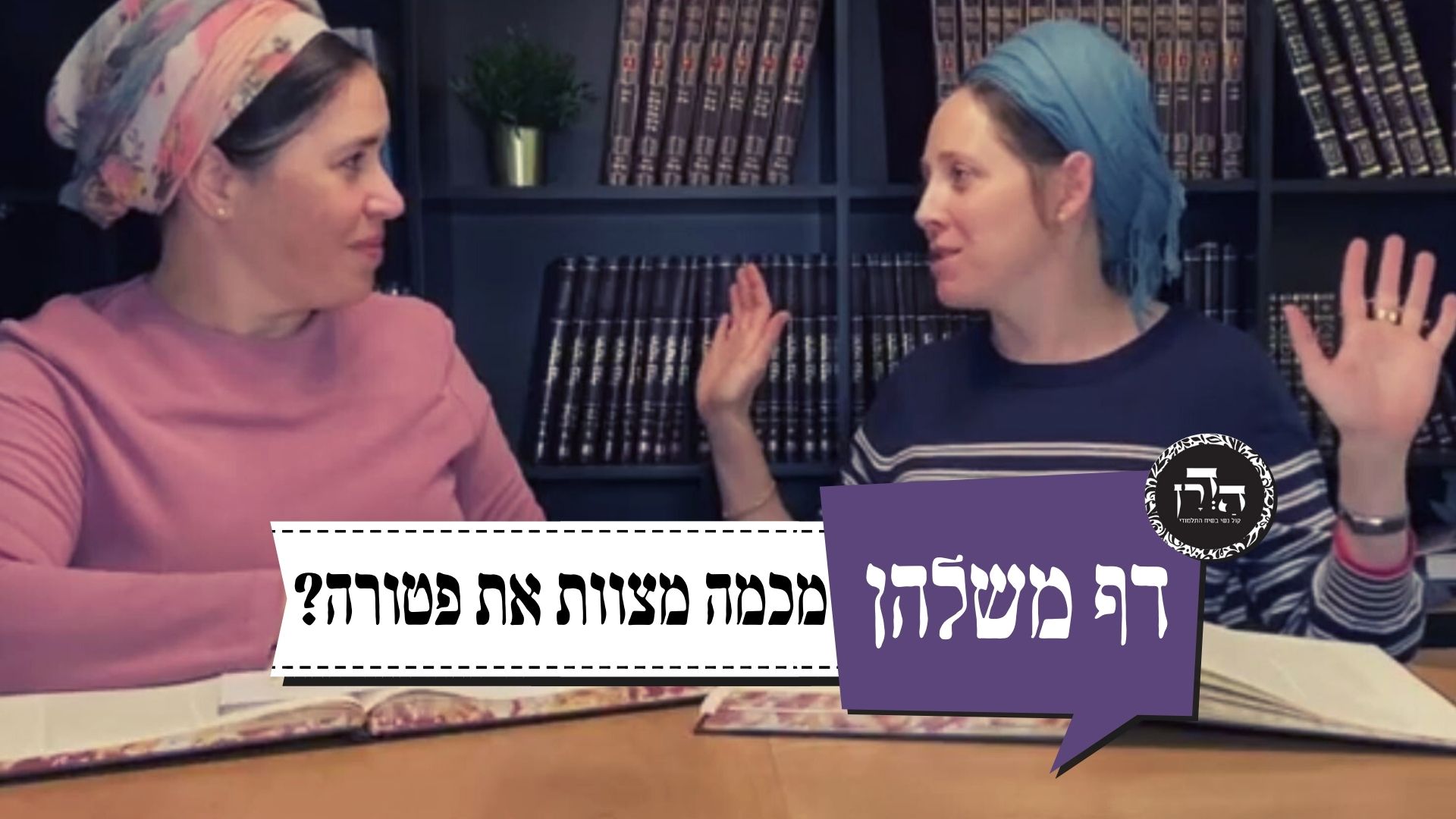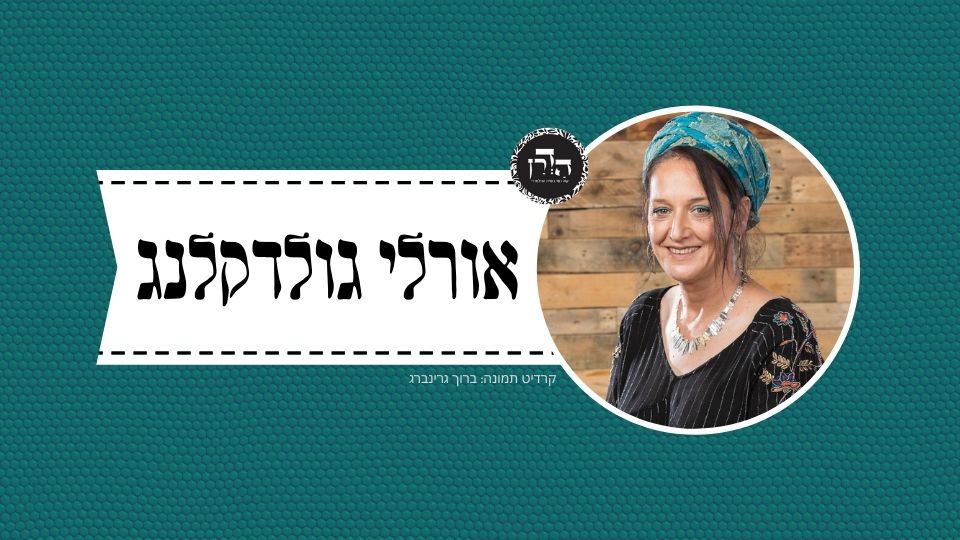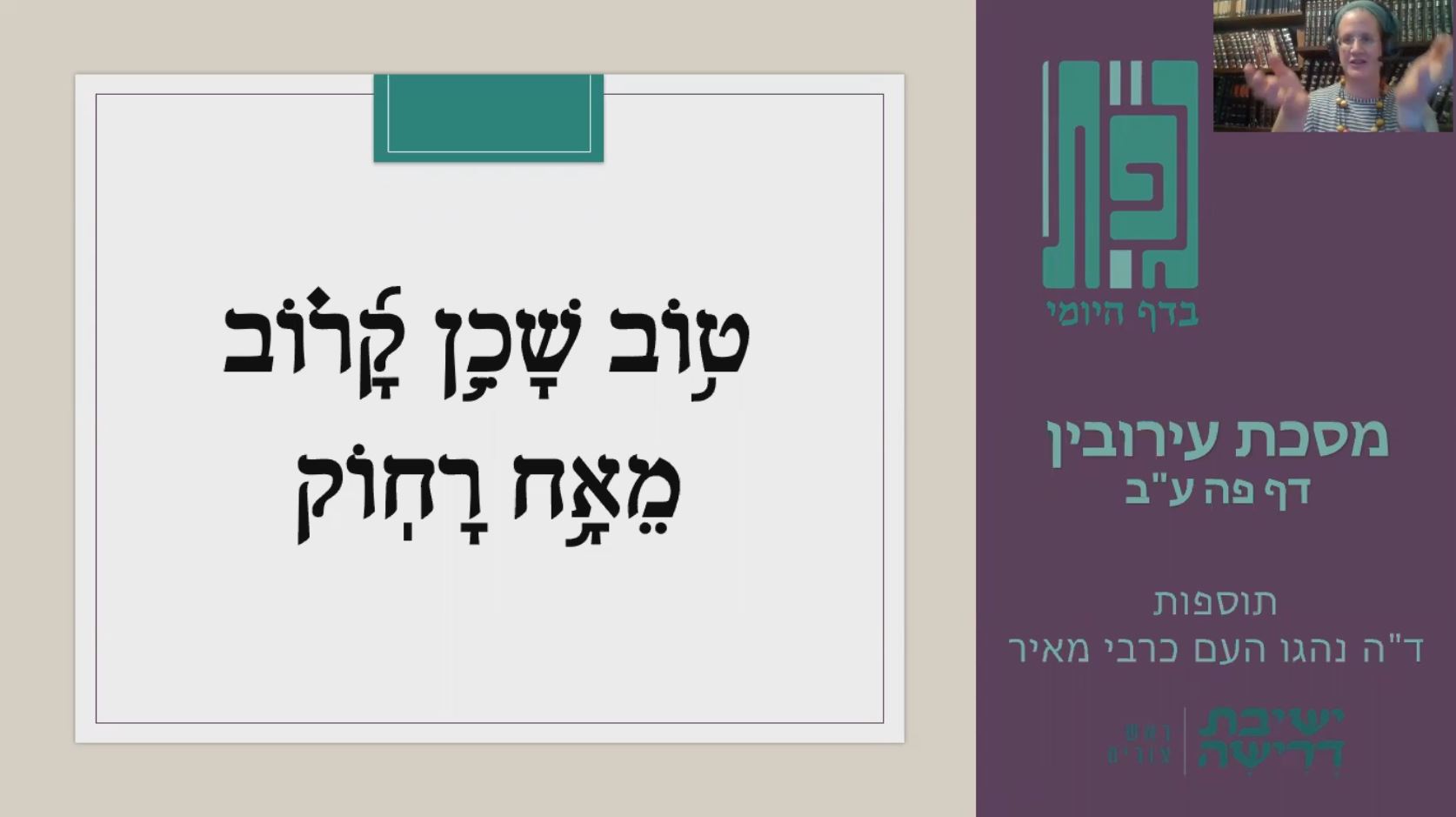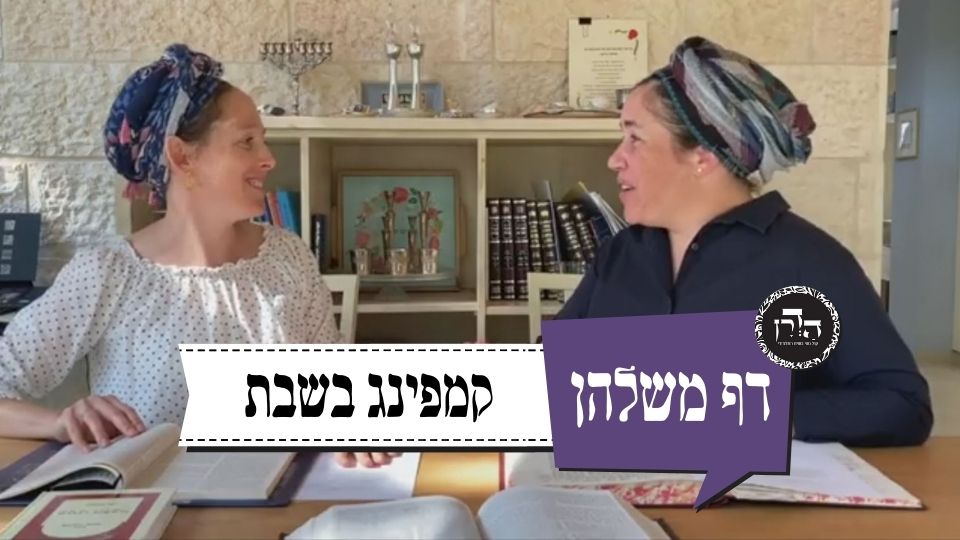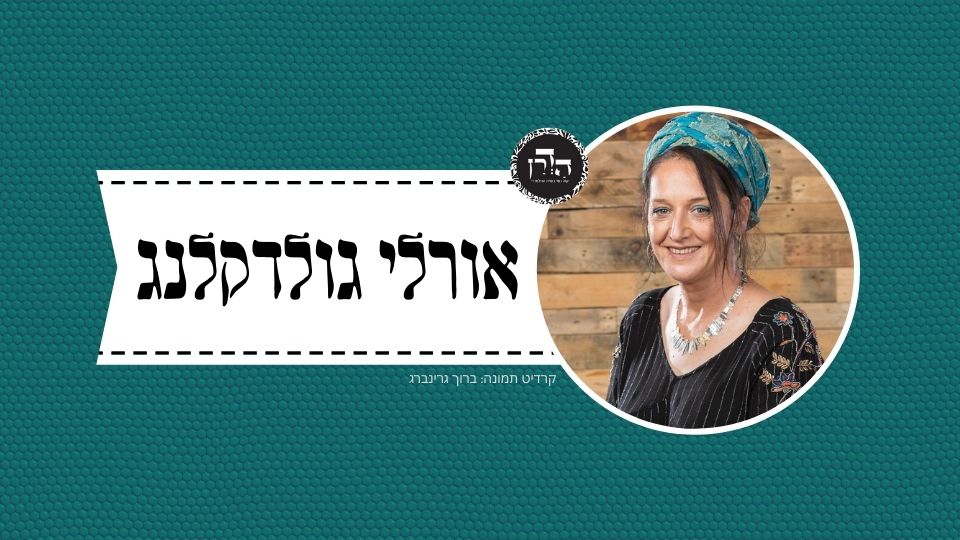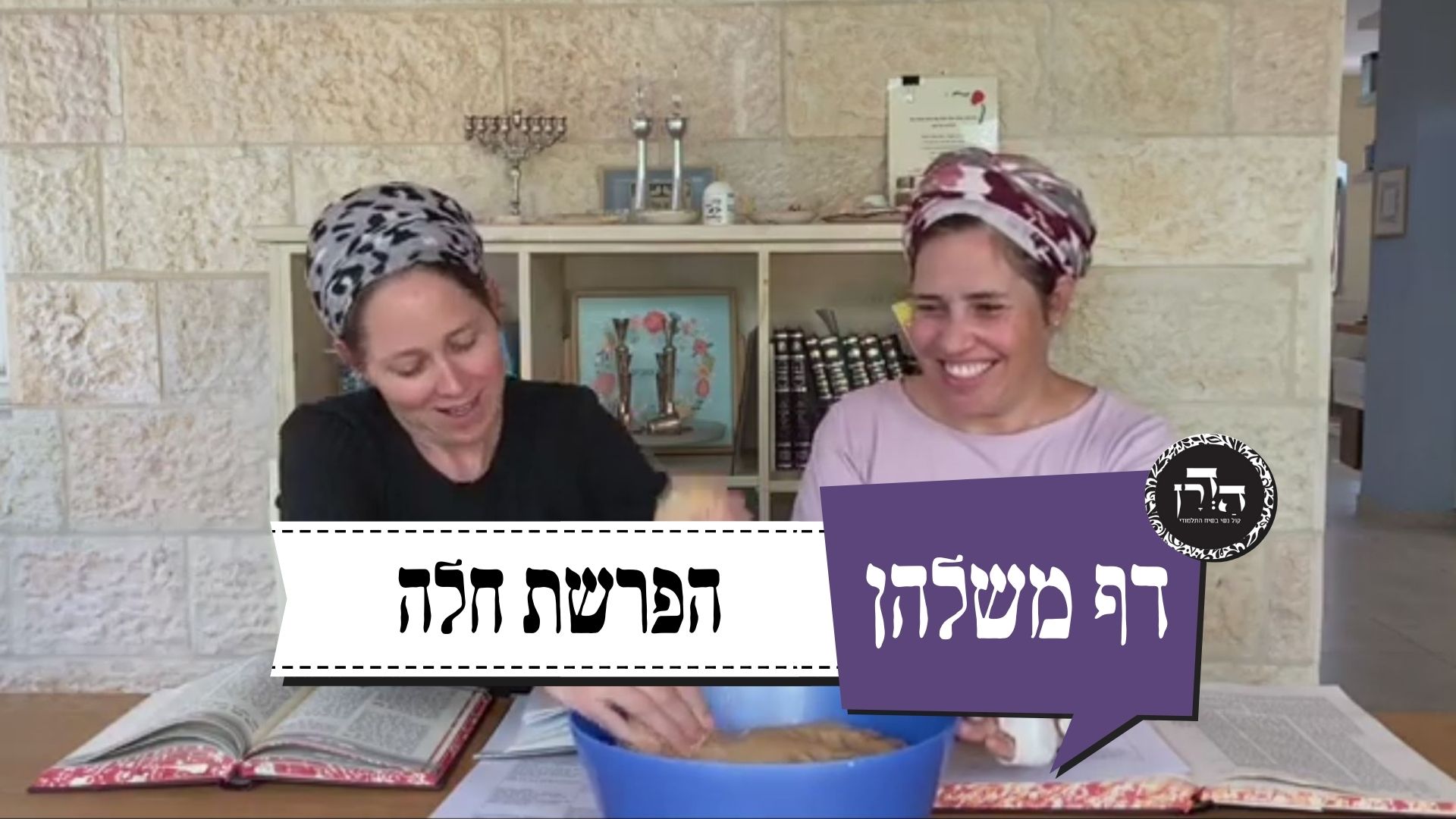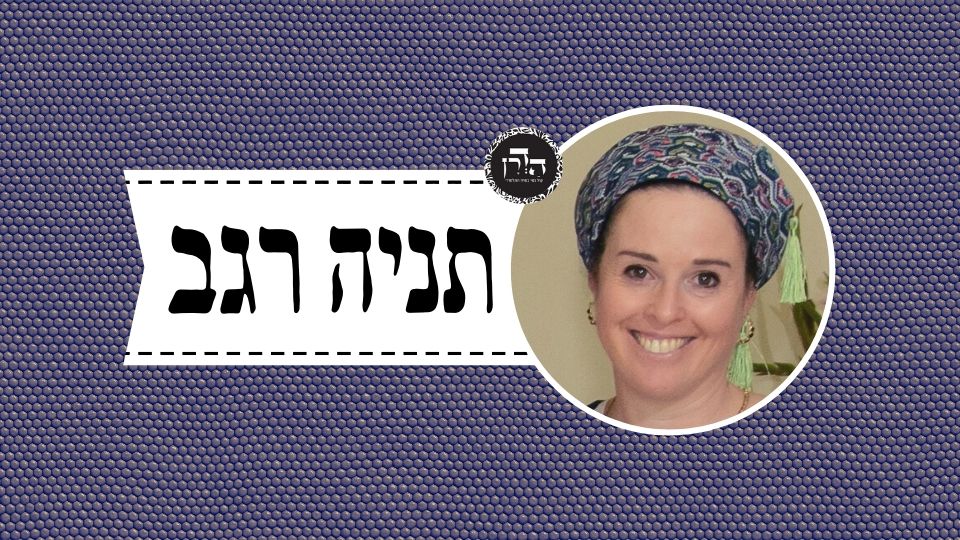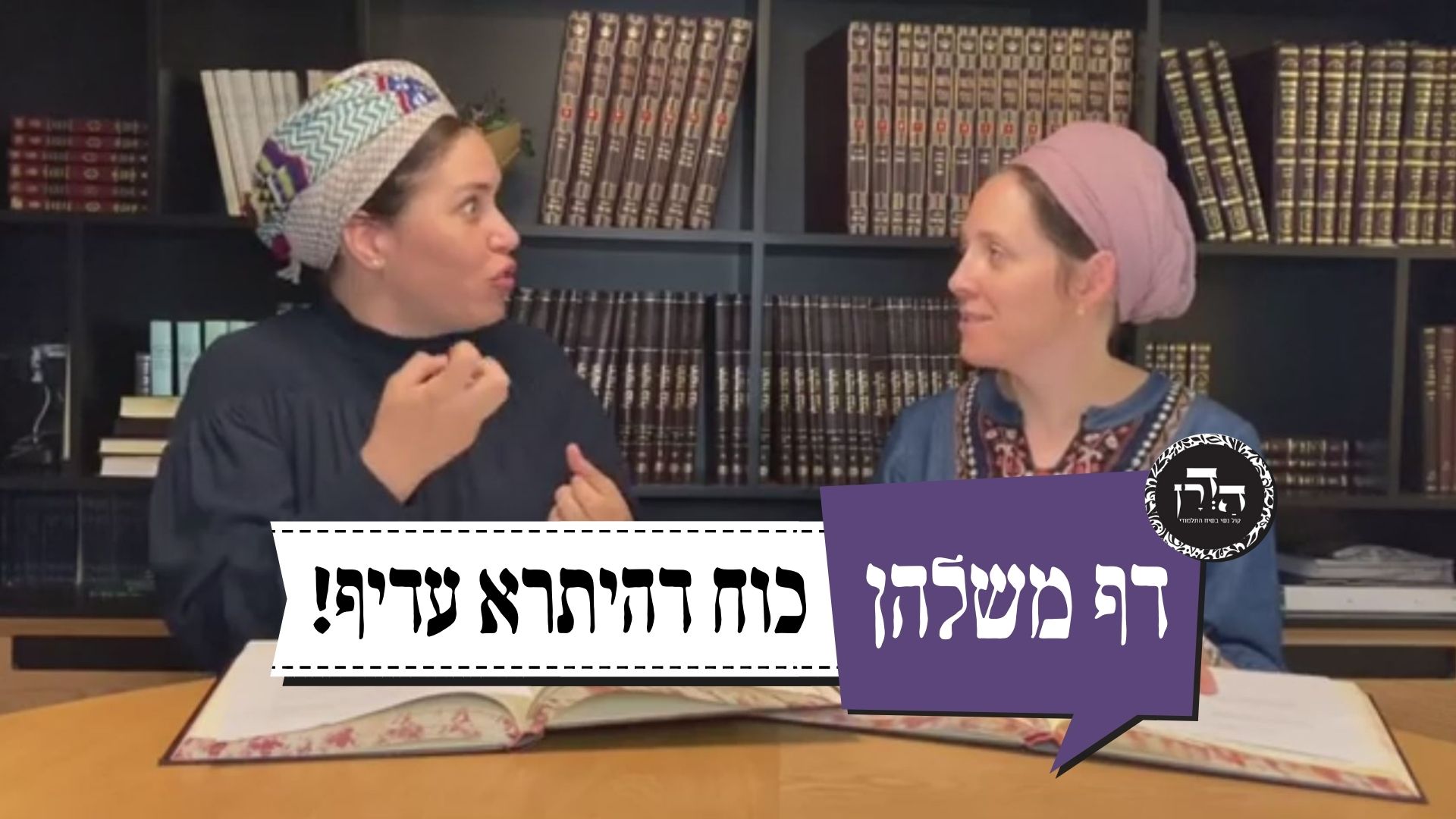הלימוד החודש מוקדש לרפואת פיליס הכט, גיטל פעשא בת מאשה רחל על ידי חברותיה הרבות שאוהבות ומעריכות אותה.
הלימוד השבוע מוקדש ע”י משפחת מילר רוטנברג לע”נ טניאל מילר.
רוצה להקדיש שיעור?

תקציר
כלים
הלימוד החודש מוקדש לרפואת פיליס הכט, גיטל פעשא בת מאשה רחל על ידי חברותיה הרבות שאוהבות ומעריכות אותה.
הלימוד השבוע מוקדש ע”י משפחת מילר רוטנברג לע”נ טניאל מילר.
כלים
העמקה
רוצה להבין מה באמת קורה מתחת לפני השטח של הסוגיה?
שיעורים, פודקאסטים והרחבות של מיטב המורות שלנו יפתחו לך עוד זוויות וכיווני חשיבה.
חדשה בלימוד הגמרא?
זה הדף הראשון שלך? איזו התרגשות עצומה! יש לנו בדיוק את התכנים והכלים שיעזרו לך לעשות את הצעדים הראשונים ללמידה בקצב וברמה שלך, כך תוכלי להרגיש בנוח גם בתוך הסוגיות המורכבות ומאתגרות.
פסיפס הלומדות שלנו
גלי את קהילת הלומדות שלנו, מגוון נשים, רקעים וסיפורים. כולן חלק מתנועה ומסע מרגש ועוצמתי.
עירובין פ
וְאֵין טוֹעֲמִין מִפֵּירוֹתֶיהָ.
and whose fruit they do not taste. This tree is evidently consecrated to the cult.
וּשְׁמוּאֵל אָמַר: כְּגוֹן דְּאָמְרִי ״הָנֵי תַּמְרֵי לְשִׁיכְרָא דְּבֵי נִצְרְפֵי דְּשָׁתוּ לֵיהּ בְּיוֹם חַגָּם״. (אָמַר אַמֵּימָר🙂 וַאֲמַרוּ לִי סָבֵי דְפוּמְבְּדִיתָא: הִלְכְתָא כְּווֹתֵיהּ דִּשְׁמוּאֵל.
And Shmuel said: For example, if they say: These dates are for the beer of the temple of Nitzrefei, which they drink on the day of their festival, then this is enough to establish the tree as an asheira. Ameimar said: And the elders of Pumbedita said to me with regard to this issue: The halakha is in accordance with the opinion of Shmuel.
מֵיתִיבִי: כֵּיצַד מִשְׁתַּתְּפִין בְּמָבוֹי — מְבִיאִים חָבִית שֶׁל יַיִן וְשֶׁל שֶׁמֶן וְשֶׁל תְּמָרִים וְשֶׁל גְּרוֹגְרוֹת וְשֶׁל שְׁאָר מִינֵי פֵּירוֹת.
The Gemara returns to Rav Yehuda’s ruling that the barrel used for merging the alleyway must be raised a handbreadth from the ground. The Gemara raises an objection from a baraita: How does one merge an alleyway? One brings a barrel of wine, or oil, or dates, or dried figs, or any other type of produce for merging the alleyway.
אִם מִשֶּׁלּוֹ — צָרִיךְ לְזַכּוֹת. וְאִם מִשֶּׁלָּהֶן — צָרִיךְ לְהוֹדִיעַ. וּמַגְבִּיהַּ מִן הַקַּרְקַע מַשֶּׁהוּ! מַאי ״מַשֶּׁהוּ״ נָמֵי דְּקָאָמַר? טֶפַח.
If one contributed a barrel of his own, he must confer possession to all the other residents by means of another person who acquires it on their behalf. And if the barrel is theirs, he must at least inform them that he is merging the alleyway. And the one acquiring it on behalf of the others raises the barrel a minimal amount from the ground. Apparently, the barrel need not be raised a handbreadth. The Gemara answers: Here too, what is this minimal amount of which the tanna of the baraita spoke? This expression means a handbreadth, but no less.
אִיתְּמַר: שִׁיתּוּפֵי מְבוֹאוֹת, רַב אָמַר: אֵין צָרִיךְ לְזַכּוֹת, וּשְׁמוּאֵל אָמַר: צָרִיךְ לְזַכּוֹת. עֵירוּבֵי תְחוּמִין, רַב אָמַר: צָרִיךְ לְזַכּוֹת, וּשְׁמוּאֵל אָמַר: אֵין צָרִיךְ לְזַכּוֹת.
It is stated that the amora’im disagreed with regard to the acquisition of a merging of alleyways. Rav said: It is not necessary to confer possession of the food used in merging the alleyway to all the residents of the alleyway; and Shmuel said: It is necessary to confer possession to them. They likewise disagreed with regard to a joining of Shabbat boundaries, but the opinions are reversed. Rav said: It is necessary to confer possession of the food to all those who wish to be included in the eiruv, and Shmuel said: It is not necessary to confer possession to them.
בִּשְׁלָמָא לִשְׁמוּאֵל — הָכָא תְּנַן, וְהָכָא לָא תְּנַן. אֶלָּא לְרַב מַאי טַעְמָא?
The Gemara raises a difficulty: Granted, according to the opinion of Shmuel, his reasoning is clear, as here, with regard to a merging of the alleyways, we learned in the mishna that he must confer possession, whereas there, with regard to a joining of Shabbat boundaries, we did not learn that this is the halakha. However, according to Rav, what is the reason that he differentiates between the cases in this manner?
תַּנָּאֵי הִיא, דְּאָמַר רַב יְהוּדָה אָמַר רַב: מַעֲשֶׂה בְּכַלָּתוֹ שֶׁל רַבִּי אוֹשַׁעְיָא שֶׁהָלְכָה לְבֵית הַמֶּרְחָץ, וְחָשְׁכָה לָהּ, וְעֵירְבָה לָהּ חֲמוֹתָהּ.
The Gemara answers: This is the subject of a dispute between the tanna’im, as Rav Yehuda said that Rav said: There was an incident involving the daughter-in-law of Rabbi Oshaya, who went before Shabbat to the bathhouse, which was located beyond the Shabbat boundary, and it grew dark before she was able to return, and her mother-in-law established a joining of Shabbat boundaries for her so that she could return home.
וּבָא מַעֲשֶׂה לִפְנֵי רַבִּי חִיָּיא — וְאָסַר. אָמַר לוֹ רַבִּי יִשְׁמָעֵאל בְּרַבִּי יוֹסֵי: בַּבְלַאי, כׇּל כָּךְ אַתָּה מַחְמִיר בְּעֵירוּבִין?! כָּךְ אָמַר אַבָּא: כֹּל שֶׁיֵּשׁ לְךָ לְהָקֵל בְּעֵירוּבִין — הָקֵל.
And the incident came before Rabbi Ḥiyya for a ruling as to whether the eiruv is valid, and he ruled that it was not valid and prohibited her return. Rabbi Yishmael, son of Rabbi Yosei, said to him: Babylonian, are you so stringent with regard to an eiruv? This is what my father said: Any case where you have the ability to be lenient with regard to an eiruv, be lenient.
וְאִבַּעְיָא לְהוּ: מִשֶּׁל חֲמוֹתָהּ עֵירְבָה לָהּ, וּמִשּׁוּם דְּלֹא זִיכְּתָה לָהּ. אוֹ דִילְמָא: מִשֶּׁלָּהּ עֵירְבָה לָהּ, וּמִשּׁוּם דְּשֶׁלֹּא מִדַּעְתָּהּ?
And a dilemma was raised before the Sages: Did the mother-in-law establish the eiruv for her daughter-in-law with the mother-in-law’s food, and Rabbi Ḥiyya prohibited it because she did not confer possession to her, i.e., she merely prepared the eiruv but did not confer possession of the food, and an eiruv of this kind is not effective? Or perhaps she established the eiruv for her with the daughter-in-law’s own food, but the eiruv was invalid because it was prepared without her knowledge?
אָמַר לָהֶן הַהוּא מֵרַבָּנַן, וְרַבִּי יַעֲקֹב שְׁמֵיהּ: לְדִידִי מִיפָּרְשָׁא לַהּ מִינֵּיהּ דְּרַבִּי יוֹחָנָן — מִשֶּׁל חֲמוֹתָהּ עֵירְבָה, וּמִשּׁוּם דְּלֹא זִיכְּתָה לָהּ.
One of the Sages, named Rabbi Ya’akov, said to them: It was personally explained to me by Rabbi Yoḥanan that the mother-in-law established the eiruv for her with the mother-in-law’s food, and Rabbi Ḥiyya prohibited it because she did not confer possession of the food to her.
אֲמַר לֵיהּ רַבִּי זֵירָא לְרַבִּי יַעֲקֹב (בְּרֵיהּ) דְּבַת יַעֲקֹב: כִּי מָטֵית הָתָם, אַקֵּיף וְזִיל לְסוּלָּמָא דְצוֹר, וּבַעְיָא מִינֵּיהּ מֵרַב יַעֲקֹב בַּר אִידִי.
Rabbi Zeira said to Rabbi Ya’akov, son of the daughter of Ya’akov: When you go there, to Eretz Yisrael, take a roundabout route, i.e., do not travel by the shortest path, and go to the Ladder of Tyre and raise this dilemma before Rav Ya’akov bar Idi.
בְּעָא מִינֵּיהּ: מִשֶּׁל חֲמוֹתָהּ עֵירְבָה, וּמִשּׁוּם דְּלֹא זִיכְּתָה לָהּ, אוֹ דִּלְמָא: מִשֶּׁלָּהּ עֵירְבָה, וּמִשּׁוּם דְּשֶׁלֹּא מִדַּעְתָּהּ?
Rabbi Ya’akov did so and raised a dilemma before him: With regard to that incident, did the mother-in-law establish the eiruv for her daughter-in-law from the mother-in-law’s food, and Rabbi Ḥiyya prohibited it because she did not confer possession of the food to her? Or perhaps she established the eiruv for her with the daughter-in-law’s own food, but the eiruv was invalidated because it was prepared without her knowledge?
אֲמַר לֵיהּ: מִשֶּׁל חֲמוֹתָהּ עֵירְבָה לָהּ, וּמִשּׁוּם דְּלֹא זִיכְּתָה לָהּ.
Rav Ya’akov bar Idi said to him: The mother-in-law established the eiruv for her with the mother-in-law’s food, and Rabbi Ḥiyya prohibited it because she did not confer possession of the food to her. Like his master and uncle, Rabbi Ḥiyya, Rav also maintains that possession of the food must be conferred upon those who wish to be included in a joining of Shabbat boundaries.
אָמַר רַב נַחְמָן: נָקְטִינַן, אֶחָד עֵירוּבֵי תְחוּמִין, וְאֶחָד עֵירוּבֵי חֲצֵירוֹת, אֶחָד שִׁיתּוּפֵי מְבוֹאוֹת צָרִיךְ לְזַכּוֹת. בָּעֵי רַב נַחְמָן: עֵירוּבֵי תַבְשִׁילִין צָרִיךְ לְזַכּוֹת, אוֹ אֵין צָרִיךְ לְזַכּוֹת?
Rav Naḥman said: We hold based on tradition that with regard to all of them, joining of Shabbat boundaries, joining of courtyards, and merging of alleyways, it is necessary to confer possession. After issuing this statement, Rav Naḥman raised a dilemma concerning an issue that was not sufficiently clear to him: With regard to a joining of cooked foods [eiruv tavshilin], which must be prepared in order to permit cooking for Shabbat on a Festival that occurs on a Friday, is it necessary to confer possession, or is it not necessary to confer possession?
אָמַר רַב יוֹסֵף: וּמַאי תִּיבְּעֵי לֵיהּ? לָא שְׁמִיעַ לֵיהּ הָא דְּאָמַר רַב נַחְמָן בַּר רַב אַדָּא אָמַר שְׁמוּאֵל: עֵירוּבֵי תַבְשִׁילִין צָרִיךְ לְזַכּוֹת. אֲמַר לֵיהּ אַבָּיֵי: פְּשִׁיטָא דְּלָא שְׁמִיעַ לֵיהּ. דְּאִי שְׁמִיעַ לֵיהּ, מַאי תִּיבְּעֵי לֵיהּ?
Rav Yosef said: What is his dilemma? Did he not hear that which Rav Naḥman bar Rav Adda said that Shmuel said: With regard to a joining of cooked foods, it is necessary to confer possession? Abaye said to Rav Yosef: It is obvious that he did not hear that ruling, as had he heard it, why would he have raised this dilemma?
אֲמַר לֵיהּ: אַטּוּ עֵירוּבֵי תְחוּמִין מִי לָא אָמַר שְׁמוּאֵל: אֵין צָרִיךְ לְזַכּוֹת, וְאָמַר אִיהוּ: צָרִיךְ לְזַכּוֹת.
Rav Yosef said to him: Didn’t Shmuel say, with regard to a joining of Shabbat boundaries, that it is not necessary to confer possession, and Rav Naḥman nonetheless said that it is necessary to confer possession? Perhaps here too Rav Naḥman did not accept Shmuel’s ruling.
הָכִי הַשְׁתָּא?! בִּשְׁלָמָא הָתָם פְּלִיגִי רַב וּשְׁמוּאֵל, וְקָא מַשְׁמַע לַן כְּחוּמְרִין דְּמָר וְכִי חוּמְרִין דְּמָר, אֲבָל הָכָא, אִי אִיתָא דִּשְׁמִיעַ לֵיהּ מִי אִיכָּא דְּמַאן דִּפְלִיג?
Abaye replied: How can you compare the two cases? Granted, there, with regard to a merging of alleyways and a joining of Shabbat boundaries, Rav and Shmuel disagree, and Rav Naḥman teaches us that the halakha is in accordance with the stringency of this master and the stringency of that master, i.e., his ruling is based on both opinions. However, here, with regard to a joining of cooked foods, if it is so, if he actually heard Shmuel’s ruling, is there anyone who disputes it? If one of his teachers issued an uncontested ruling, it is presumably an established halakha.
הָהוּא טוּרְזִינָא דַּהֲוָה בְּשִׁיבָבוּתֵיהּ דְּרַבִּי זֵירָא, אֲמַרוּ לֵיהּ: אוֹגַיר לַן רְשׁוּתָךְ, לָא אוֹגַיר לְהוּ. אֲתוֹ לְקַמֵּיהּ דְּרַבִּי זֵירָא אֲמַרוּ לֵיהּ: מַהוּ, לְמֵיגַר מִדְּבֵיתְהוּ?
A certain gentile superintendent [turzina] lived in Rabbi Zeira’s neighborhood. The neighbors said to him: Rent your domain to us so that we may carry on Shabbat. However, he would not rent it to them. They came before Rabbi Zeira and asked him: What is the halakha if we seek to rent the domain from his wife without her husband’s knowledge?
אֲמַר לְהוּ: הָכִי אָמַר רֵישׁ לָקִישׁ מִשְּׁמֵיהּ דְּגַבְרָא רַבָּה, וּמַנּוּ רַבִּי חֲנִינָא: אִשְׁתּוֹ שֶׁל אָדָם מְעָרֶבֶת שֶׁלֹּא מִדַּעְתּוֹ.
Rabbi Zeira said to them: Reish Lakish said as follows in the name of a great man, and who is this great man? It is Rabbi Ḥanina. He stated: A man’s wife may establish an eiruv without his knowledge. According to this principle, the superintendent’s wife could indeed rent out the domain without his knowledge.
הָהוּא טוּרְזִינָא דַּהֲוָה בְּשִׁיבָבוּתֵיהּ דְּרַב יְהוּדָה בַּר אוֹשַׁעְיָא, אָמְרִי לֵיהּ: אוֹגַר לַן רְשׁוּתָךְ, לָא אוֹגַר לְהוּ. אֲתוֹ לְקַמֵּיהּ דְּרַב יְהוּדָה בַּר אוֹשַׁעְיָא, אָמְרִי לֵיהּ: מַהוּ לְמֵיגַר מִדְּבֵיתְהוּ, לָא הֲוָה בִּידֵיהּ. אֲתוֹ לְקַמֵּיהּ דְּרַב מַתְנָה, לָא הֲוָה בִּידֵיהּ. אֲתוֹ לְקַמֵּיהּ דְּרַב יְהוּדָה, אֲמַר לְהוּ: הָכִי אָמַר שְׁמוּאֵל: אִשְׁתּוֹ שֶׁל אָדָם מְעָרֶבֶת שֶׁלֹּא מִדַּעְתּוֹ.
The Gemara relates a similar incident: A certain superintendent lived in the neighborhood of Rav Yehuda bar Oshaya. The neighbors said to him: Rent your domain to us so that we may establish an eiruv and carry on Shabbat, but he would not rent it to them. They came before Rav Yehuda bar Oshaya and said to him: What is the halakha if we seek to rent it from his wife? He did not have a ready answer at hand. They subsequently came before Rav Mattana, and he too did not have an answer at hand. They came before Rav Yehuda, who said to them that Shmuel said as follows: A man’s wife may establish an eiruv without his knowledge, and the same applies to renting out his property.
מֵיתִיבִי: נָשִׁים שֶׁעֵירְבוּ וְנִשְׁתַּתְּפוּ שֶׁלֹּא מִדַּעַת בַּעֲלֵיהֶן, אֵין עֵירוּבָן עֵירוּב, וְאֵין שִׁיתּוּפָן שִׁיתּוּף!
The Gemara raises an objection from a baraita: Women who joined the courtyards or merged the alleyways without the knowledge of their husbands, their eiruv is not a valid eiruv, and their merging of alleyways is not a valid merging. How can Shmuel rule against an explicit baraita?
לָא קַשְׁיָא: הָא — דְּאָסַר, הָא — דְּלָא אָסַר.
The Gemara answers: This is not difficult. In this case, where Shmuel said that a wife may establish an eiruv without her husband’s knowledge, he was referring to a situation where the husband would prohibit his neighbors from carrying if he did not join their eiruv, and the halakha is therefore lenient, as a wife may establish an eiruv on his behalf. However, in that case, the baraita, which states that his wife may not establish an eiruv without his knowledge, is referring to a situation where he would not prohibit his neighbors from carrying.
הָכִי נָמֵי מִסְתַּבְּרָא, דְּאִם כֵּן קַשְׁיָא דִּשְׁמוּאֵל אַדִּשְׁמוּאֵל, דְּאָמַר שְׁמוּאֵל: אֶחָד מִבְּנֵי מָבוֹי שֶׁרָגִיל לְהִשְׁתַּתֵּף עִם בְּנֵי מָבוֹי, וְלֹא נִשְׁתַּתֵּף — בְּנֵי הַמָּבוֹי נִכְנָסִין לְתוֹךְ בֵּיתוֹ וְנוֹטְלִין שִׁיתּוּפָן מִמֶּנּוּ בְּעַל כׇּרְחוֹ.
The Gemara adds: So too, it is reasonable that this is the correct interpretation, as if you do not say this, there is a contradiction between this ruling of Shmuel and another ruling of Shmuel. As Shmuel said: With regard to one of the residents of an alleyway who was accustomed to join in a merging of alleyways with the other residents of the alleyway, but one Shabbat he did not join in a merging of alleyways with them, the other residents of the alleyway may enter his house and take his contribution to their merging of alleyways from him even against his will.
רָגִיל אִין, שֶׁאֵין רָגִיל לָא. שְׁמַע מִינַּהּ.
The Gemara infers: If he was accustomed to join in their merging of the alleyway, yes, they may enter his house to collect his contribution, but if he was not accustomed to do so, no, they may not do so. Clearly, it is not possible in all cases to compel a person to participate in a merging of alleyways against his will. The Gemara concludes: Indeed, conclude from it that it is so.
לֵימָא מְסַיַּיע לֵיהּ: כּוֹפִין אוֹתוֹ לַעֲשׂוֹת לֶחִי וְקוֹרָה לַמָּבוֹי.
The Gemara suggests: Let us say that the following baraita supports him. The residents of an alleyway may compel anyone who lives in the alleyway to erect a side post and a cross beam for the alleyway. This teaching indicates that with regard to these Shabbat enactments, a person’s wishes are not taken into account; rather, others may act on his behalf even against his will.
שָׁאנֵי הָתָם דְּלֵיכָּא מְחִיצוֹת.
The Gemara answers: It is different there, as there are no partitions. That alley is breached, and it is therefore fitting to compel its residents to establish some sort of partition, if only for the sake of protection. However, if there are partitions, one is not obligated to join in a merging of alleyways.
לִישָּׁנָא אַחֲרִינָא, מְצָד שָׁאנֵי.
Another version of this explanation: From the side it is different, i.e., the preparation of an eiruv does not involve an adjustment to the alleyway itself, but rather it is a side issue. Consequently, an individual cannot be forced to participate in its preparation (Meir Netiv).
אִתְּמַר, רַב חִיָּיא בַּר אָשֵׁי אָמַר: עוֹשִׂין לֶחִי אֲשֵׁירָה. וְרַבִּי שִׁמְעוֹן בֶּן לָקִישׁ אָמַר: עוֹשִׂין קוֹרָה אֲשֵׁירָה.
It is stated that the amora’im disputed this issue. Rav Ḥiyya bar Ashi said: One may build a side post from the wood of an asheira. Although it is prohibited to benefit from the tree and it must be burned, setting up a side post is a mitzva, and mitzvot were not given for benefit, i.e., the fulfillment of a mitzva is not in itself considered a benefit. And Rabbi Shimon ben Lakish said: One may build a cross beam from the wood of an asheira.
מַאן דְּאָמַר קוֹרָה — כׇּל שֶׁכֵּן לֶחִי, וּמַאן דְּאָמַר לֶחִי — אֲבָל קוֹרָה לָא. כַּתּוֹתֵי מְכַתַּת שִׁיעוּרֵיהּ.
The Gemara clarifies their opinions: With regard to the one who said that one may build a cross beam from the wood of an asheira, Rabbi Shimon ben Lakish, all the more so he would permit a side post to be prepared from an asheira. And the one who said that one may build a side post from an asheira, Rav Ḥiyya bar Ashi, spoke only of a side post; but as for a cross beam, no, he did not permit one to build it from an asheira. The reason is that an asheira must be burned, and it is therefore as though its size has already been crushed. Consequently, a cross beam, which must be at least a handbreadth in size, may not be prepared from an asheira. With regard to a side post, by contrast, a minimum width suffices, which means that even wood from an asheira is fit, despite the fact that it is viewed as burned.
מַתְנִי׳ נִתְמַעֵט הָאוֹכֶל — מוֹסִיף וּמְזַכֶּה, וְאֵין צָרִיךְ לְהוֹדִיעַ. נִתּוֹסְפוּ עֲלֵיהֶן — מוֹסִיף וּמְזַכֶּה, וְצָרִיךְ לְהוֹדִיעַ.
MISHNA: If the food in the barrel for the merging of the alleyway diminished and was less than the requisite measure, one may add a little of his own and confer possession to the others, and he need not inform them of his addition. However, if new residents were added to the residents of the alleyway, he may add food on behalf of those residents and confer possession to them, and he must inform the new residents of their inclusion in the merging of alleyways.
כַּמָּה הוּא שִׁיעוּרָן? בִּזְמַן שֶׁהֵן מְרוּבִּין — מְזוֹן שְׁתֵּי סְעוּדוֹת לְכוּלָּם. בִּזְמַן שֶׁהֵן מוּעָטִין — כִּגְרוֹגֶרֶת לְכׇל אֶחָד וְאֶחָד.
What is the measure of food required for a merging of the alleyways? When the residents of the alley are numerous, food for two meals is sufficient for all of them; when they are few, less than a certain number, a dried fig-bulk for each and every one of them is enough.
אָמַר רַבִּי יוֹסֵי: בַּמֶּה דְּבָרִים אֲמוּרִים — בִּתְחִילַּת עֵירוּב, אֲבָל בִּשְׁיָרֵי עֵירוּב — כׇּל שֶׁהוּא.
Rabbi Yosei said: In what case is this statement said? It is said with regard to the beginning of an eiruv, when it is initially established. However, with regard to the remnants of an eiruv, e.g., if the eiruv decreased in size on Shabbat, it remains valid if even any amount remains.
וְלֹא אָמְרוּ לְעָרֵב בַּחֲצֵירוֹת אֶלָּא כְּדֵי שֶׁלֹּא לְשַׁכֵּחַ אֶת הַתִּינוֹקוֹת.
And in general they said that it is necessary to join the courtyards, even though a merging of the alleyways was already in place, only so that the halakhic category of eiruv will not be forgotten by the children, i.e., so that the next generation should be aware that an eiruv can be established for a courtyard, for otherwise they would be entirely unaware of this halakhic category.
גְּמָ׳ בְּמַאי עָסְקִינַן? אִילֵימָא בְּמִין אֶחָד, מַאי אִירְיָא נִתְמַעֵט? אֲפִילּוּ כָּלָה נָמֵי!
GEMARA: The mishna stated: If the food in the barrel for the merging of the alleyway diminished and was less than the requisite measure, one may add to it without informing the others. The Gemara poses a question: With what case are we dealing here? If you say that he added the same type of food that had initially been used for the merging of the alleyway, why specify this particular case where the food decreased in measure? Even if the food was entirely finished, he should likewise not be obligated to inform them.
אֶלָּא בִּשְׁנֵי מִינִין, אֲפִילּוּ נִתְמַעֵט נָמֵי לָא! דְּתַנְיָא: כָּלָה הָאוֹכֶל, מִמִּין אֶחָד — אֵין צָרִיךְ לְהוֹדִיעַ, מִשְּׁנֵי מִינִים — צָרִיךְ לְהוֹדִיעַ!
Rather, perhaps it is referring to two types of food, i.e., one added a different kind of food that had not been used beforehand. If so, even if it only decreased in measure, no, he should also not be permitted to add to the merging of the alleyway without informing them. As it was taught in a baraita: If the food of a merging of the alleyway was entirely finished, and he added the same type of food to it, he need not inform the other residents; however, if the amount he added was from two types of food, i.e., if the added food was different from the original, he must inform them. The Gemara assumes that the same halakha is in effect even if the food of the merging of the alleyway only decreased in measure.
אִיבָּעֵית אֵימָא: מִמִּין אֶחָד, וְאִיבָּעֵית אֵימָא: מִשְּׁנֵי מִינִין. אִיבָּעֵית אֵימָא: מִמִּין אֶחָד, מַאי נִתְמַעֵט — נִתְמַטְמֵט.
The Gemara answers: If you wish, say that the mishna is referring to a case where his addition was from the same kind of food, and if you wish, say instead that it was from two kinds. The Gemara clarifies the previous statement: If you wish, say that it is referring to a case where his addition was from the same kind of food, and what is the meaning of decreased? It means that the food entirely crumbled away, so that nothing at all remained.
וְאִיבָּעֵית אֵימָא: מִשְּׁנֵי מִינִין, כָּלָה שָׁאנֵי.
And if you wish, say instead that the mishna is referring to a case where his addition was from two kinds of food, for if the eiruv was entirely finished, the halakha is different. That is to say, the halakha of the baraita that he must inform the others is in effect only if the food was entirely finished, but if any of it remains there is no need to inform them of his addition, and he may confer possession of even a different kind of food.
נִיתּוֹסְפוּ עֲלֵיהֶן מוֹסִיף וּמְזַכֶּה וְכוּ׳. אָמַר רַב שֵׁיזְבִי אָמַר רַב חִסְדָּא: זֹאת אוֹמֶרֶת חֲלוּקִין עָלָיו חֲבֵירָיו עַל רַבִּי יְהוּדָה.
We learned in the mishna: If other residents were added to the residents of the alleyway, he may add food for those residents and confer possession to them, but he must inform the new residents of their inclusion in the merging of the alleyway. Rav Sheizvi said that Rav Ḥisda said: That is to say, i.e., we can infer from the mishna, that Rabbi Yehuda’s colleagues disagree with him.
דִּתְנַן: אָמַר רַבִּי יְהוּדָה: בַּמֶּה דְּבָרִים אֲמוּרִים — בְּעֵירוּבֵי תְחוּמִין, אֲבָל בְּעֵירוּבֵי חֲצֵירוֹת — מְעָרְבִין בֵּין לְדַעַת וּבֵין שֶׁלֹּא לְדַעַת. פְּשִׁיטָא דַּחֲלוּקִין!
As we learned in a mishna that Rabbi Yehuda said: In what case is this statement, that an eiruv may be established for a person only with his knowledge, said? It is said with regard to a joining of Shabbat boundaries; however, with regard to a joining of courtyards, one may establish an eiruv for another person either with his knowledge or without his knowledge. Rabbi Yehuda’s opinion conflicts with that of the tanna of the mishna, who does not permit a person to be included in a joining of courtyards without his knowledge. The Gemara is surprised at this statement: It is obvious that they disagree; why did Rav Ḥisda find it necessary to teach us something so evident?
מַהוּ דְּתֵימָא: הָנֵי מִילֵּי בְּחָצֵר שֶׁבֵּין שְׁנֵי מְבוֹאוֹת, אֲבָל חָצֵר שֶׁל מָבוֹי אֶחָד, אֵימָא לָא. קָמַשְׁמַע לַן.
The Gemara answers: It was nonetheless necessary, lest you say that this ruling, i.e., that he must inform them, applies only to a courtyard that is situated between two alleyways, in which case the residents of the courtyard may join in a merging of alleyways with whichever alleyway they prefer. Consequently, he must inform them with which alleyway he prepared the merging, in case they preferred to join the other alleyway. However, with regard to a courtyard that opens into only one alleyway, the merging of the alleyway only benefits them and does not harm them in any way, and you might therefore say no, that even the tanna of the mishna concedes that it is not necessary to inform them. Rav Ḥisda therefore teaches us that the tanna of the mishna maintains that he must inform them in all cases, contrary to the opinion of Rabbi Yehuda.
כַּמָּה הוּא שִׁיעוּרוֹ וְכוּ׳. כַּמָּה הוּא מְרוּבִּין? אָמַר רַב יְהוּדָה אָמַר שְׁמוּאֵל: שְׁמוֹנֶה עֶשְׂרֵה בְּנֵי אָדָם. שְׁמוֹנֶה עֶשְׂרֵה, וְתוּ לָא: אֵימָא מִשְּׁמוֹנֶה עֶשְׂרֵה וְאֵילָךְ.
The mishna continues: What is the measure of food required for a merging of the alleyways? It then specifies different amounts when the residents of the alley are numerous and when they are few. The Gemara asks: How many are numerous, and how many are considered few? Rav Yehuda said that Shmuel said: Eighteen people are considered numerous. The Gemara registers surprise: Eighteen and no more? The Gemara answers: Say: From eighteen upward.
וּמַאי שְׁמוֹנֶה עֶשְׂרֵה דְּנָקֵט? אָמַר רַב יִצְחָק בְּרֵיהּ דְּרַב יְהוּדָה: לְדִידִי מִיפָּרְשָׁא לִי מִנֵּיהּ דְּאַבָּא: כׇּל שֶׁאִילּוּ מְחַלְּקוֹ לִמְזוֹן שְׁתֵּי סְעוּדוֹת בֵּינֵיהֶן וְאֵין מַגַּעַת גְּרוֹגֶרֶת לְכׇל אֶחָד וְאֶחָד — הֵן הֵן מְרוּבִּין, וְסַגִּי בִּמְזוֹן שְׁתֵּי סְעוּדוֹת. וְאִי לָא — (הֵן הֵן) מוּעָטִין נִינְהוּ.
The Gemara asks: And what is the significance of the number eighteen that he cited? Why this figure in particular? The Gemara answers that Rav Yitzḥak, son of Rav Yehuda, said: It was explained to me personally by my father, Rav Yehuda: Any case where, if one were to divide the food of two meals between them and it does not amount to the measure of a dried fig for each and every one of them, these are the very ones the tanna called numerous, and in this case food for two meals suffices for all of them. And if not, these are the very ones the tanna termed few, which means food in the measure of a dried fig is required for each of them.
וְאַגַּב אוֹרְחֵיהּ קָא מַשְׁמַע לַן דִּשְׁתֵּי סְעוּדוֹת הָוְיָין שְׁמוֹנֶה עֶשְׂרֵה גְּרוֹגְרוֹת.
And Rav Yehuda incidentally teaches us that food for two meals consists of a measure equal to eighteen dried figs. Consequently, if there were numerous residents in the alley, then eighteen dried figs, which is food sufficient for two meals, is enough for them.
מַתְנִי׳ בַּכֹּל מְעָרְבִין וּמִשְׁתַּתְּפִין, חוּץ מִן הַמַּיִם וּמִן הַמֶּלַח, דִּבְרֵי רַבִּי אֱלִיעֶזֶר. רַבִּי יְהוֹשֻׁעַ אוֹמֵר: כִּכָּר הוּא עֵירוּב, אֲפִילּוּ מַאֲפֶה סְאָה, וְהוּא פְּרוּסָה — אֵין מְעָרְבִין בָּהּ. כִּכָּר כְּאִיסָּר וְהוּא שָׁלֵם — מְעָרְבִין בּוֹ.
MISHNA: One may join courtyards and merge alleyways with all types of food, except for water and salt, as they are not considered foods. This is the statement of Rabbi Eliezer. Rabbi Yehoshua says that a different limitation applies: A whole loaf may be used for an eiruv. With regard to a baked product even the size of a se’a, if it consists of pieces, one may not join courtyards with it. However, with regard to a loaf, even one the size of an issar, if it is whole, one may join courtyards with it.



